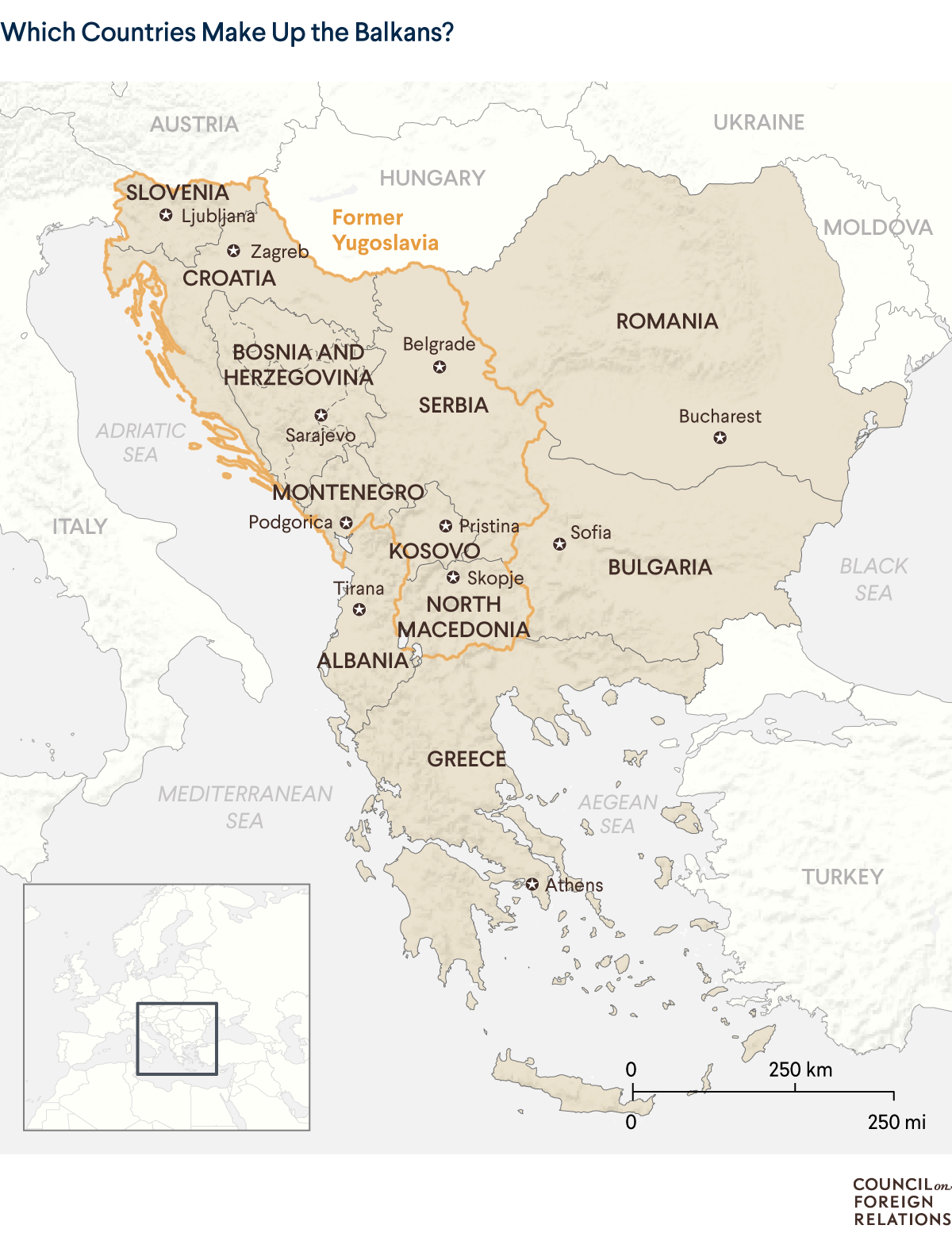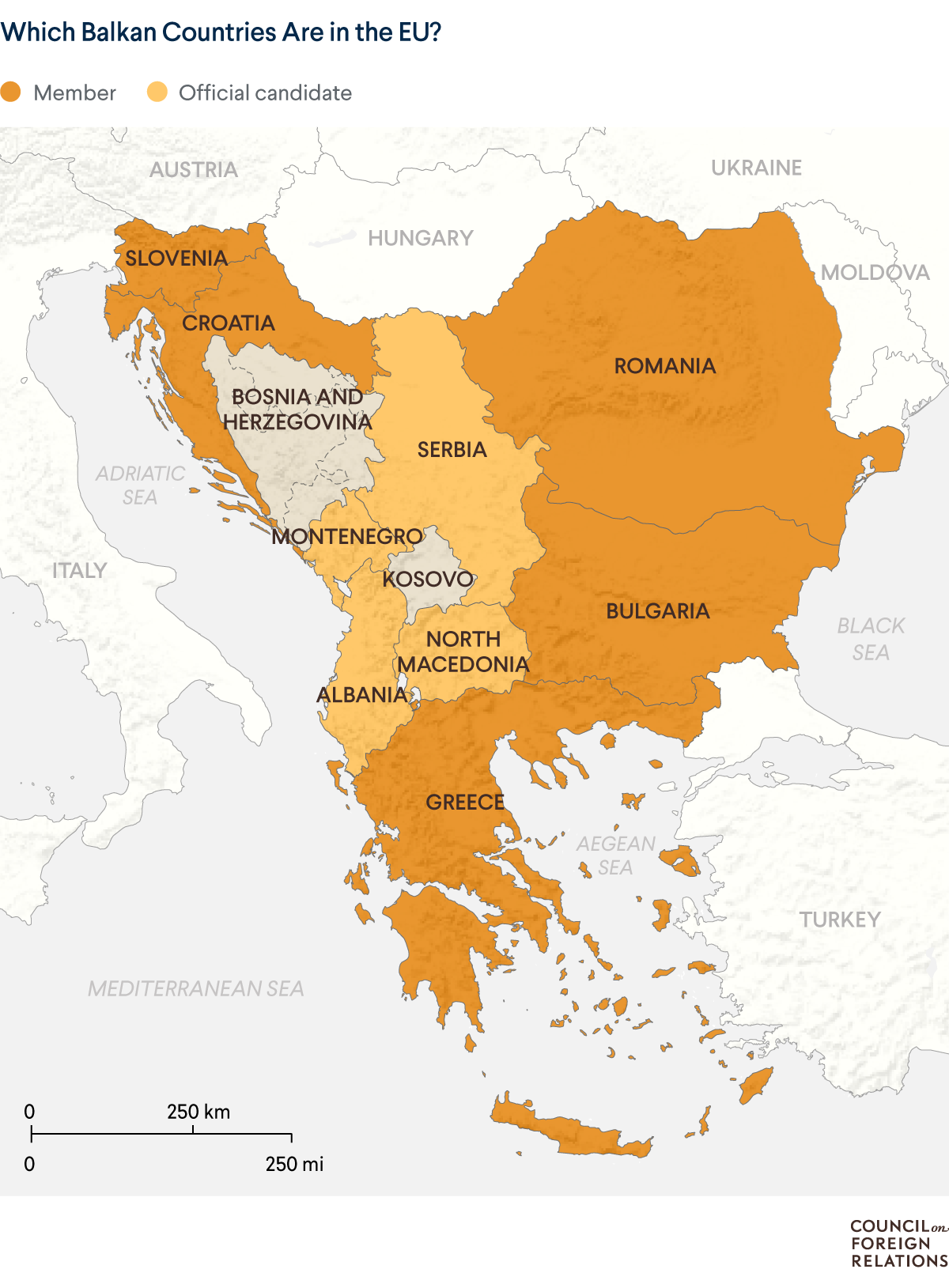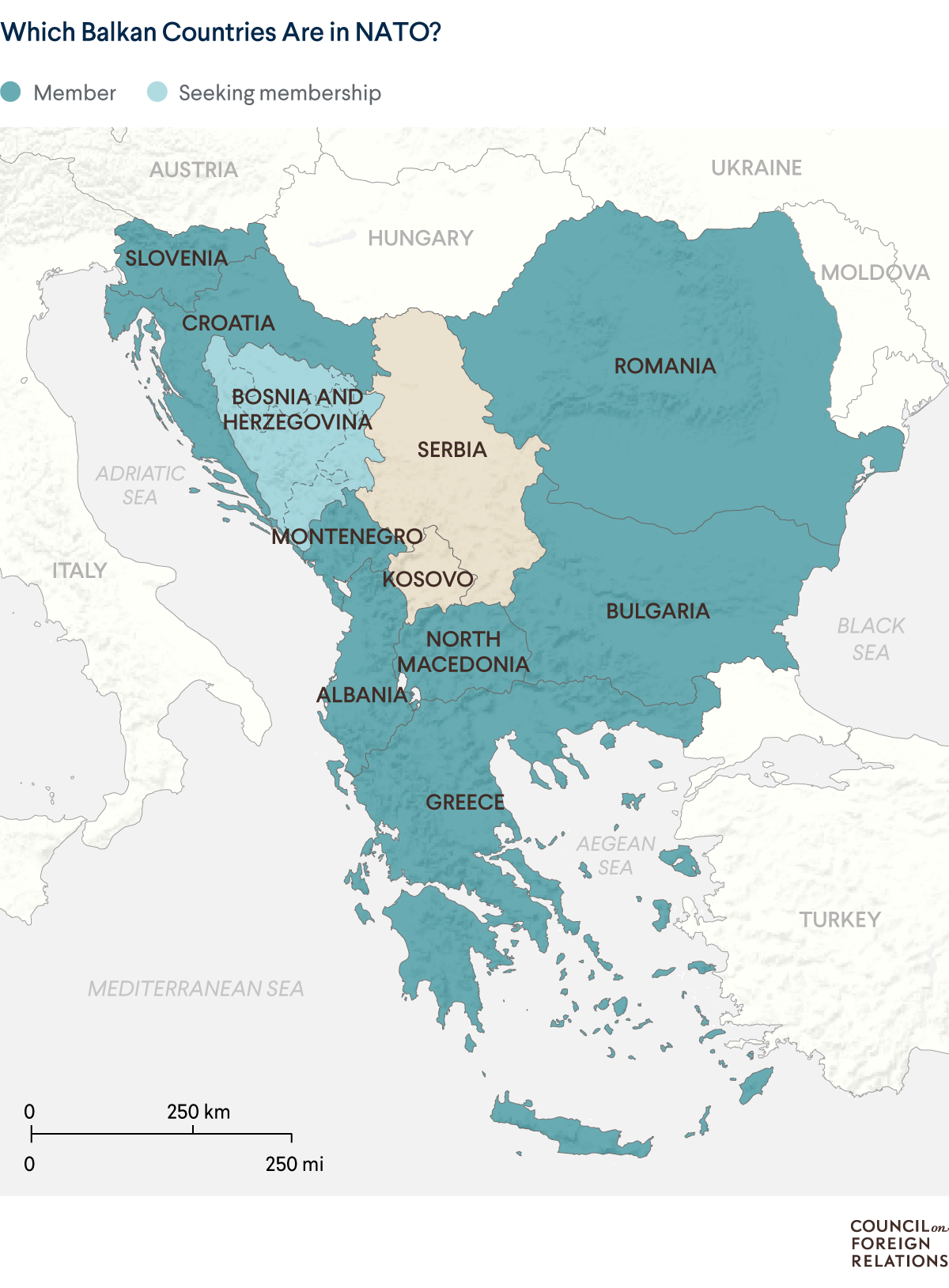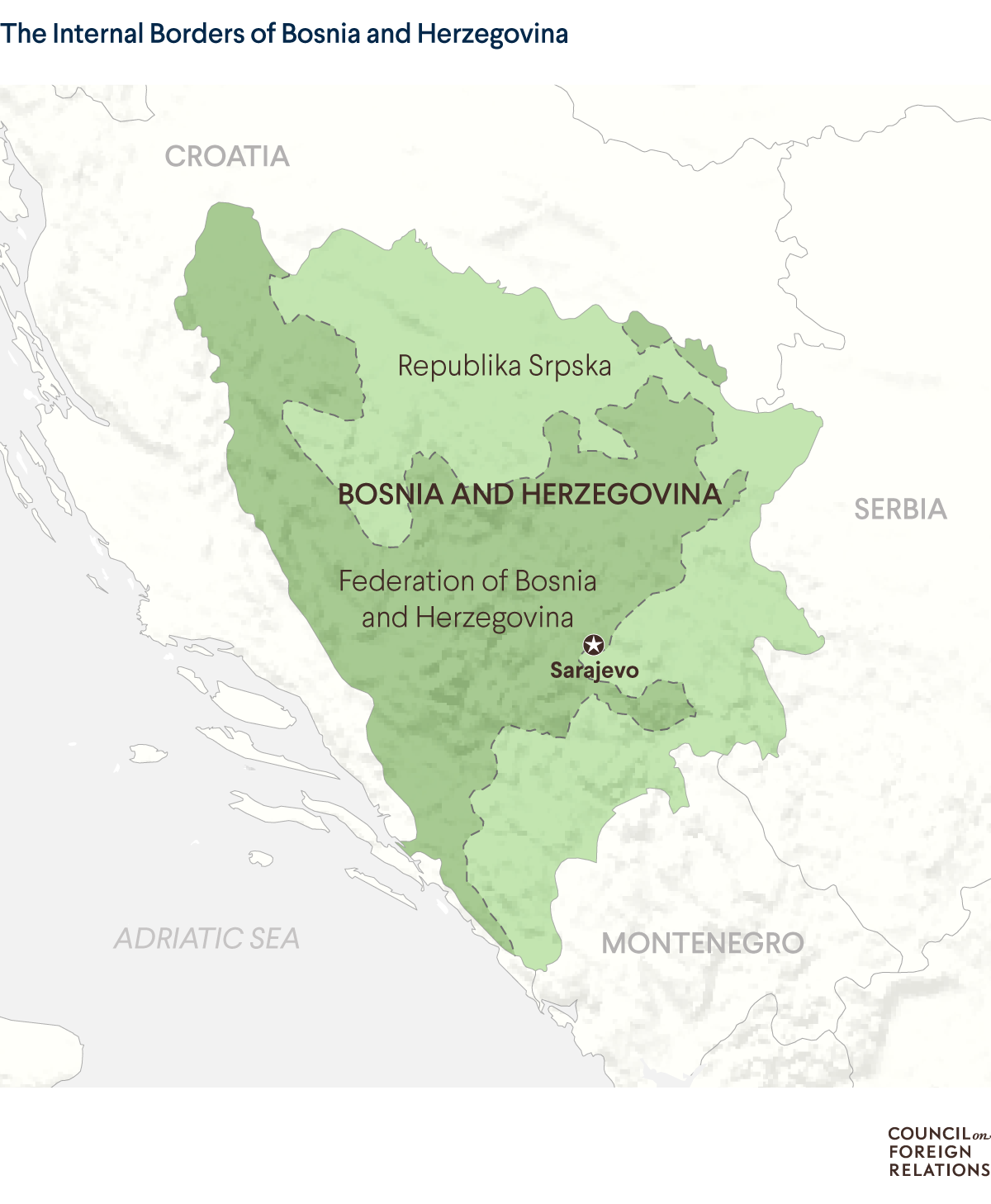Russia’s Influence in the Balkans

- Russia has long cultivated close ties with Serbia and other Slavic allies in the Balkans, a region at the crossroads of East and West.
- Russia resents the region’s push for integration with the European Union (EU) and the North Atlantic Treaty Organization (NATO), and it seeks to leverage persistent ethnic and religious fault lines to undermine those efforts.
- Russia’s 2022 invasion of Ukraine has led some Balkan governments to distance themselves from Moscow, but progress on EU accession remains slow.
Introduction
The Balkans have been at the center of great-power competition for centuries. Russia has long played a leading role, supporting its Slavic and Orthodox Christian allies in Serbia and elsewhere in the region. The disintegration of Yugoslavia in the 1990s and the resulting conflicts placed the Balkans back at the forefront of European politics.
Now, more than two decades after the Yugoslav wars, the political arrangements created to balance the claims of myriad ethnic and religious communities are becoming increasingly precarious. While much of the region seeks deeper integration with the European Union (EU) and the North Atlantic Treaty Organization (NATO), Western analysts say Moscow is trying to leverage simmering tensions to block those efforts. However, Russian President Vladimir Putin’s war in Ukraine could undermine Russia’s sway in the Balkans, they say, and Western countries should seize the opportunity to recommit to the region.
Could the Balkans become a geopolitical flash point?
More on:
Geopolitical antagonism over the region has mounted for decades in the wake of the dissolution of Yugoslavia in the 1990s and the wars that followed. As already strained relations between Russia and the West have deteriorated further over the Ukraine war, tensions have also risen in the Balkans.
Attempts to shepherd Balkan nations into Western institutions have consistently drawn pushback from Russia and the local nationalist and separatist groups it supports. With the specter of unresolved conflict looming in Bosnia and Herzegovina and between Serbia and Kosovo, Western analysts say Moscow is seeking to leverage ongoing instability to maintain its influence and weaken the EU and NATO.
What has the Ukraine war meant for Russia’s role in the region?
Analysts say Putin’s invasion has raised the stakes for Balkan governments. Serbia’s situation is perhaps the most precarious, as President Aleksandar Vucic weighs EU efforts to isolate Moscow against his country’s long-standing ties to Russia, especially its reliance on Russian energy and diplomatic support for its position on Kosovo. So far he has walked a tightrope, angering Moscow and many of his own supporters by joining the UN resolution condemning the Ukraine invasion and refusing to recognize Russia’s annexations. At the same time, he has frustrated EU leaders by declining to join the bloc’s sanctions regime. While the EU has pressed for sweeping bans on Russian energy, Vucic instead made a three-year gas supply deal with Russia.

However, some analysts argue that the war could weaken Russia’s position in the Balkans, where many policymakers resent the disruptions it has caused. The Carnegie Endowment for International Peace’s Maxim Samorukov writes that Putin’s use of Kosovo’s bid for independence to justify the annexation referendums in eastern Ukraine angered many Serbian nationalists, who see it as legitimizing Kosovo’s claims. In response, Vucic has increasingly distanced himself from the Kremlin. The war has spurred Serbia, which relies on Russian imports for nearly all of its gas and much of its oil, to seek energy diversification: Vucic announced that due to EU bans on Russian oil, Serbia will build new refineries capable of handling crude from around the world. In 2023, the country also inked a new deal for natural gas supplies from Azerbaijan.
More on:
Meanwhile, since the invasion of Ukraine, the EU peacekeeping mission in Bosnia and Herzegovina (EUFOR) has nearly doubled its forces to roughly 1,100 deployed personnel. Some proponents of NATO expansion have seized on the moment to argue for fast-tracking the country’s entry into the alliance. The upheaval might also be increasing the urgency in Brussels: in July 2022, member states reached a deal to unblock long-stalled talks on bringing Albania and North Macedonia into the EU, but progress on clearing up the remaining hurdles remains slow.
What are Russia’s interests in the Balkans?
Moscow has long sought to play a balancing role by supporting its Serbian allies. It’s an objective that dates back centuries, as the Russian Empire developed close cultural, political, and religious ties to the Balkans. With control of the region contested by the Catholic Western powers and the Islamic Ottoman empire, Russia positioned itself as an ally and patron of the Orthodox Christian Slavs, especially in Bulgaria, Romania, and Serbia.
In the modern era, it saw Western interventions in Yugoslavia—especially the 1999 NATO bombing of Kosovo, which was then a breakaway province of Serbia—as a sign of Russia’s diminishing influence. For Putin, who took power less than a year later, the Kosovo conflict has been a foundational grievance against Western powers. He saw NATO strikes on Serbian forces as a statement of intent that Russian interests would no longer be seriously considered in international decision-making. His government would go on to oppose the international war crimes tribunals for Serbian leaders, withdraw its peacekeeping forces from Kosovo in 2003, and block UN recognition of Kosovo’s 2008 declaration of independence.

Under Putin, Russia has sought to reclaim its role as a power broker in European politics and a force to be reckoned with on the global stage. As EU security analyst Stanislav Secrieru writes, the Balkans are central to Putin’s arguments for the return of “multipolarity” in world affairs, in opposition to what he sees as the U.S.-dominated unipolar order.
NATO expansion is also at the heart of Putin’s complaints against the West; he maintains that Western leaders broke their commitment to forgo eastward expansion and are instead seeking to encircle and destroy Russia. Moscow has seen close relations with Balkan countries as a means of forestalling their accession to both NATO and the EU, and a way to project its naval power in the Mediterranean, another long-standing goal of Russian statecraft. Montenegro, for instance, possessed the last non-NATO ports on the Adriatic Sea before it joined the alliance in 2017.

How has Russia wielded influence?
Russia’s approach centers on finding low-cost or asymmetrical means of slowing the Balkans’ integration into Western institutions while deepening ties with Serbia and Serb groups throughout the region. It seeks to exploit regional cleavages and amplify tensions between ethnic and religious communities.
Additionally, the Russian government mobilizes state-controlled firms, including energy giant Gazprom and state bank Sberbank, to make investments across the region that it calculates will boost its political sway. Moscow has also proven skillful in blurring the lines between official and unofficial state actions, often channeling its support through proxies. It cultivates influence through an array of non-governmental pathways, such as support for clubs, schools, sports teams, religious centers, media outlets, and veterans groups. Nurturing this soft power gives Russia leverage with a broad cross section of society while offering the Kremlin deniability.
Some notable examples are:
Serbia and Kosovo. By blocking UN recognition of Kosovo’s independence, Moscow positions itself as a defender of Serbian territorial integrity. This boosts Russia’s popularity among Serbs and puts pressure on Belgrade to maintain friendly relations with Moscow. High-level diplomacy, such as Putin’s state visit to Belgrade in 2019, seeks to further cement this relationship. Bilateral military ties have grown, with Serbia purchasing more Russian arms, including air defense systems, anti-tank weapons, and drones. Their militaries carry out joint exercises and some U.S. policymakers say a Russia-run humanitarian center in Niš, Serbia, is a front for intelligence operations throughout the region. On an unofficial level, Russian nationals help fund and organize nationalist and paramilitary groups, including through controversial military-style training camps for Serbian youth.
Russia also wields influence through religious ties. The Serbian Orthodox Church looks to the larger Russian Orthodox Church to back its claims in Kosovo, which contains some of Orthodoxy’s holiest religious sites. Russian Orthodox charity groups, the largest of which is run by Russian billionaire and close Putin ally Konstantin Malofeev, operate in Serbia and throughout the Balkans, amplifying ideas of a pan-Slavic civilization opposed to the West.
Energy and health diplomacy play roles as well. Serbia granted Gazprom a majority stake in its national oil company in 2008 and gets its natural gas from Russian sources. And during the COVID-19 pandemic, Russia moved quickly to provide Serbia with medical supplies and doses of its Sputnik vaccine, though Vucic’s government eventually diversified its vaccine supply.
Bosnia and Herzegovina. The 1995 Dayton Accords, which ended the Bosnian War, created a delicate balancing act between two entities: the Federation of Bosnia and Herzegovina, populated largely by Catholic Croats and Muslim Bosniaks, and the Republika Srpska, populated mostly by Orthodox Serbs. CFR Senior Fellow Charles A. Kupchan has warned that with separatist sentiment rising, that balance is at risk. Russia has backed Bosnian Serb separatism both officially, through the Republika Srpska, and informally through myriad cultural, religious, educational, and paramilitary groups. Moscow has stepped up its support for Bosnian Serb leader Milorad Dodik, who has vowed to withdraw the Republika Srpska from Bosnia and Herzegovina’s national institutions. Russian weapons suppliers have helped arm the Republika Srpska’s police forces while Russian mercenaries have trained members of Bosnian Serb paramilitary groups.

Moscow likewise favors Croat nationalists in the country—who also seek to undermine the Dayton framework—to help stave off reforms that could allow Sarajevo to move its accession processes forward. Meanwhile, some analysts say that Russia has used its UN Security Council sway to weaken EUFOR’s mandate, leading to calls for a greater NATO role there. Russian diplomats have warned that Sarajevo’s entry into NATO would constitute a “hostile act.”
Elsewhere in the region. NATO has been a flash point in other countries of the former Yugoslavia. Russia strenuously opposed Montenegro’s accession to the alliance, promising unspecified retaliation if it joined. In 2016, Montenegrin prosecutors charged Russian intelligence agents with helping to plan a coup d’etat meant to overthrow the pro-NATO government. (Convictions in the case were overturned on appeal in 2021 and the nature of events remains contested.)
Moscow has also sought to throw a wrench in North Macedonia’s entry into NATO and the EU, progress on both of which was blocked for nearly two decades due to a dispute with neighboring Greece. As Skopje and Athens approached a compromise in 2018, Moscow fomented opposition to the deal through various channels, including by funding organizers of local protests. That led Greece to expel Russian diplomats and warn its longtime ally against interfering in its affairs. North Macedonia joined NATO in 2020.
How have Western countries responded?
Western countries and institutions have been intimately involved in efforts to stabilize the region since NATO’s first combat missions helped bring the Serbs to the negotiating table in the 1990s. Since Serbia’s rejection of Kosovo’s independence bid, the EU has attempted to bridge the gap between Belgrade and Pristina. Those talks have made progress on some administrative issues, though Serbia still refuses to recognize Kosovo as a sovereign state. In 2020, separate, U.S.-brokered talks led to the reestablishment of many economic and transit links and preliminary steps toward a land-swap agreement. But tensions remain high: after cross-border violence led to a Serbian military buildup in 2023, the Serbia-Kosovo dialogue turned acrimonious, which Western analysts say represents a boon to Putin's hopes of scuttling their EU accession.
Still, some critics say that Western involvement since the Yugoslav wars has been too narrowly focused on maintaining stability, rather than on improving economic and political institutions to allow for a more conclusive integration of the region. Recent years have seen the EU increasingly divided over the bloc’s expansion. Croatia was the latest country to join the bloc, in 2013, and though most other Western Balkan countries are considered EU candidates, their progress has lagged due to unresolved territorial disputes or opposition from member states. The EU’s recent backing of accession for Georgia, Moldova, and Ukraine has further highlighted this lag, though the bloc hopes that a new, $6.4 billion investment package announced in October 2023 will jumpstart Balkan reform.
Analysts such as the American Enterprise Institute’s Ivana Stradner warn against Western passivity, worrying that it opens the door for greater Russian involvement. CFR’s Kupchan has similarly argued that with Washington’s focus on the Middle East and the Indo-Pacific, the United States has put the region “on the back burner.”
“The entirety of the Balkan Peninsula is poised to, sooner or later, be integrated into Atlantic institutions,” he wrote in late 2021. “Given the region’s propensity for ethnic conflict, sooner would be far better than later.”
Recommended Resources
In Foreign Affairs, David Shedd and Ivana Stradner warn that a worsening Serbia-Kosovo conflict would be a gift to Russia.
CFR Senior Fellow Charles A. Kupchan argues that rising nationalism in the Balkans should spur greater attention from the West.
The Economist reports that Russia’s Balkan allies are being forced to recalibrate amid the war in Ukraine.
For the New York Times, Andrew Higgins explores Putin’s persistent popularity among Serbs.
In Foreign Policy, Jade McGlynn of the Monterey Initiative in Russian Studies explains why the Kosovo War is still a primary motivator for Putin’s foreign policy.
For the Carnegie Endowment for International Peace, Paul Stronski and Annie Himes dig into Russia’s tactics and goals in the Balkans.
Author Robert D. Kaplan offers a reader’s guide to the Balkans.
Will Merrow and Michael Bricknell created the graphics for this Backgrounder.
 Online Store
Online Store
